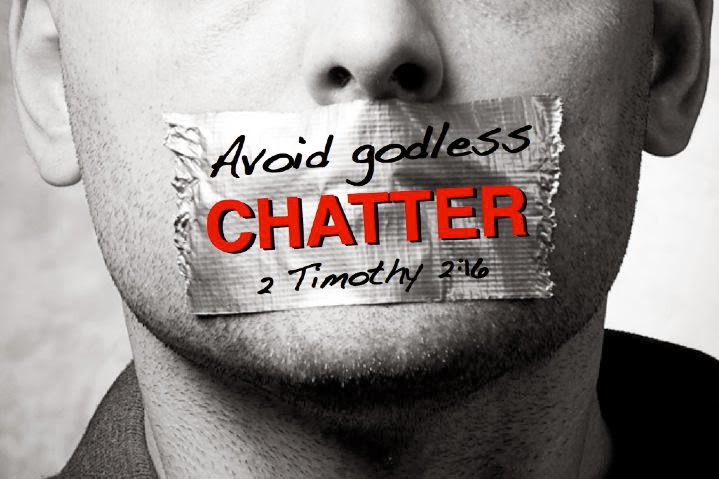What is godless chatter?
What is godless
chatter?
The term godless chatter is used by the apostle Paul when he exhorts Timothy
to, “Avoid godless chatter, because those who indulge in it will become more
and more ungodly. Their teaching will spread like gangrene. Among them are
Hymenaeus and Philetus, who have wandered away from the truth. They say that
the resurrection has already taken place, and they destroy the faith of some”
(2 Timothy 2:16-18, NIV).
In context, this passage of
Scripture is dealing with the godless chatter of false teachers who were sneaking into the church
and trying to corrupt the truth of God’s Word (2 Timothy 2:14-3:9). Paul
clearly warns Timothy about them when he points them out by saying, “Their
teaching will spread like gangrene” (2:17). Paul likens the godless chatter of false teachers to gangrene, which was a deadly
disease that spread rapidly and ate away at a persons flesh. This Greek idiom
truly emphasizes the repulsiveness of the ministry of the false teachers, as
well as the dangers of their contaminated message spreading into the hearts and
lives of others.
The Greek word for “godless”
is bebēlos, and is used 5 times
in the NT, and is used to describe something that is, “unhallowed or profane.
It is the opposite of sacred.” The Greek word for “chatter” is kenophōnia, and is used to describe, “empty, foolish talk, talk
which lacks significant content, i.e. fruitless discussion.” Paul combines
these two words together to describe a false teacher.
There are four individual’s
that serve as examples in Paul’s letter to Timothy that help demonstrate what
godless chatter is. They are Hymenaeus and Philetus (2 Timothy 2:17-18), and
Jannes and Jambres (2 Timothy 3:8). Hymenaeus and Philetus wandered away from
the truth in the worst possible way, by teaching that “the resurrection has
already taken place”, which destroyed the faith of certain individuals (2
Timothy 2:18). Jannes and Jambres were men who opposed the ministry of Moses.
These men resisted the truth, because of their corrupt minds, and their folly
was made known to all (2 Timothy 3:8-9).
Errant teaching doesn’t
appear to be the only area that is classified as “godless chatter”. Paul seems
to indicate to Timothy that striving about words that are of no profit (2
Timothy 2:14), as well as being quarrelsome and harsh with others, impatient,
and proud while teaching others (cf. 2 Timothy 2:24), appear to be included
with godless chatter as well. Also included with these are, “profane and old
wives’ fables” (1 Timothy 4:7), and “idle babblings and contradictions of what
is falsely called knowledge” (1 Timothy 6:20).
It would appear that godless
chatter is any type of foolish, insignificant, or fruitless discussion, that
has the ability to wreck the faith of others (2 Timothy 2:18), and or, lead to
more ungodliness (2 Timothy 2:16).
How do you avoid godless
chatter?
The way to avoid godless chatter is also laid out in Paul’s letters
to Timothy. In order to avoid godless chatter, you must “not strive about words
to no profit, to the ruin of the hearers” (2 Timothy 2:14), and you must also
“reject” (1 Timothy 4:7), and “avoid” profane and idle babblings and
contradictions to the truth of Scripture (1 Timothy 6:20). Here we see that the
way to avoid godless chatter is to not argue about things that are
unprofitable, and to reject and avoid those who teach contrary to the truth of
God’s Word. Paul’s final exhortation to Timothy about false teachers in this
passage (2 Timothy 2:14-3:9) is really the key to avoiding godless chatter, and
that exhortation is, “from such people turn away!” (2 Timothy 3:5)


